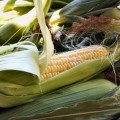Why is Organic Food More Expensive?
Having spent most of my life in the midst of the farm market world, one question I’ve become very familiar with over the years is: “Why is Organic Food More Expensive?”
 Even in this day and age there are still some people who think organic food is just a scheme cooked up by farmers so they can slap a fancy label on their produce and charge more. Some people actually resent organic farmers for charging more, feeling they should charge the same as conventional farmers. I’ve actually heard people use the logic that if there are less chemicals in organic food, then it should cost less to raise. The truth is, the fewer the chemicals there are, the more work that’s involved. So why is organic food more expensive? Because there’s so much more that goes into it than conventional farming.
Even in this day and age there are still some people who think organic food is just a scheme cooked up by farmers so they can slap a fancy label on their produce and charge more. Some people actually resent organic farmers for charging more, feeling they should charge the same as conventional farmers. I’ve actually heard people use the logic that if there are less chemicals in organic food, then it should cost less to raise. The truth is, the fewer the chemicals there are, the more work that’s involved. So why is organic food more expensive? Because there’s so much more that goes into it than conventional farming.
Why is Organic Food More Expensive? – The Work is Harder
Simply put, raising food organically takes a lot more physical work and produces a lot more expenses. Some people who complain about the price of organic food are often under the false assumption that an organic farmer just goes out and sprays their plants like any conventional farmer, just using organic sprays instead of conventional. That’s not true, however.
Conventionally sprayed crops are genetically modified (often with genes that aren’t even from the same species) to allow them to survive being hit with spray while the surrounding weeds are killed by the spray. Organic plants, however, are raised more along the old fashioned lines. Weeds aren’t sprayed in organic farming, they have to be cultivated out, and hoed out, and pulled by hand in hard to reach places.
This costs a lot more time compared to the conventional farmer who just goes out, gives their crops a round of spray, and is done with that field until harvest. The same is true of pests. An organic farmer can’t just go out and dust for potato bugs, they have to pick them off by hand one at a time or spray them by hand with soap. (I can’t tell you how many hours of my life I’ve spent plucking potato bugs off the plants).
In the case of meat or eggs, animals have to be raised on organic feeds (more expensive because it’s grown by organic standards) and they’re not given hormones. As such, they grow slower and consume more food in order to reach selling size, which costs the farmer more money to raise them. Also if the animals get sick, organic farmers are limited in how can they can treat the animals. They can’t just shoot them up with a bunch of antibiotics like conventional farmers, so they often have more loss.
Organic Food Costs More to Grow
Organic farming also has more overhead than traditional farming. For one thing organic seeds are more expensive right off the bat. A pack of organic seed is usually quite a bit more than a pack of traditional seed because the plants the seeds came from had to be raised with organic standards, no sprays, and no GMO’s. Organic fertilizers cost more because they’re not oil-based synthetics like those used in conventional farming. Also the “fancy label” of certified organic costs money. In order to be certified organic, besides raising everything according to the organic specifications, farmers also have to pay their fees to the government. There’s a lot of red tape and inspections associated with those fees as well before a farmer finally gets the right to put the organic label on all their hard work.
 Organic farming is more work, and more expensive to do. These are expenses that the farmer has to pass onto the consumer or they’d be spending more than they’re making, which wouldn’t really help them make a living. After all the expenses and extra work are accounted for, organic farmers don’t make any more than conventional farmers.
Organic farming is more work, and more expensive to do. These are expenses that the farmer has to pass onto the consumer or they’d be spending more than they’re making, which wouldn’t really help them make a living. After all the expenses and extra work are accounted for, organic farmers don’t make any more than conventional farmers.
So why raise food organically if it’s so much more difficult and so much more expensive? Because many people are conscious about what they put into their bodies, and don’t want a lot of GMO’s and pesticides going into their organs. People who know how much extra work and cost goes into organics are willing to pay the extra for much healthier food. Also many organic farmers choose to raise food organically because it’s better for the environment. They don’t want to be part of polluting the waterways with unnecessary sprays and leeching the grounds of nutrients by planting the same thing in the same place over and over again.
Organic foods cost more, but they’re worth it in long run. They’re healthier for us (which can often mean fewer health problems and hospital bills later in life), and they’re healthier for the environment.
Written by Amber Reifsteck, The Woodland Elf
The information provided on this website is for general information purposes only. If you choose to rely on the information on this website, you do so at your own risk and you assume responsibility for the results. (Full disclaimer here)
Enjoy this post? Click here to subscribe by email and get new posts delivered to your inbox.Ads by Google







